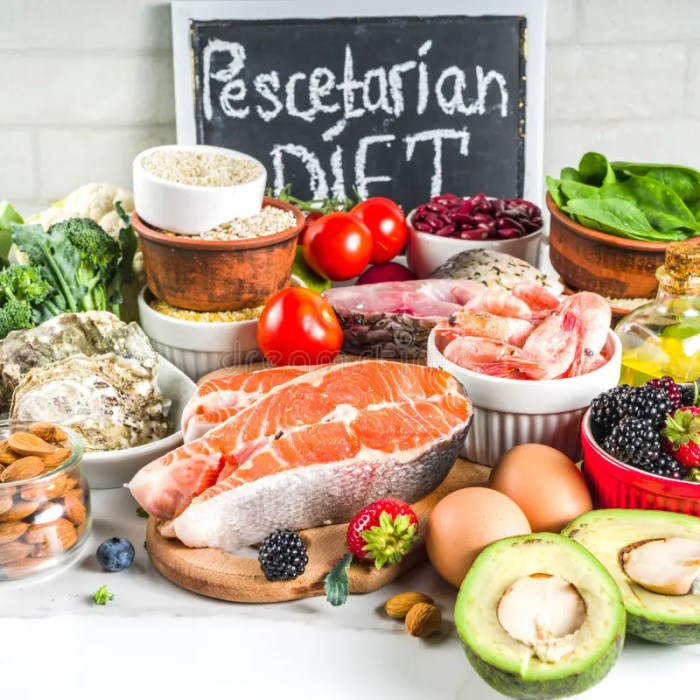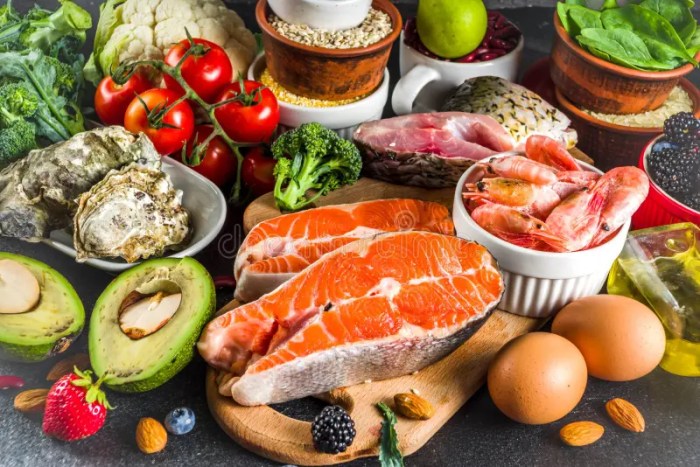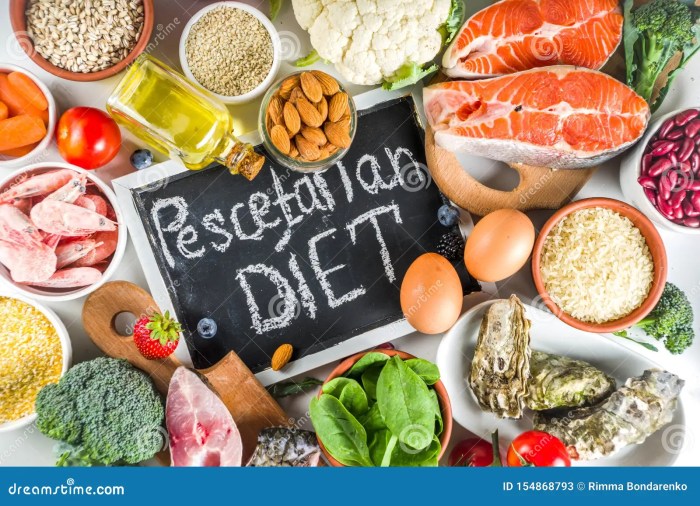A balanced pescetarian diet, combining the benefits of plant-based foods with the nutritional value of seafood, offers a unique approach to healthy eating. This comprehensive guide delves into the essentials of a pescetarian diet, exploring its nutritional considerations, meal planning strategies, and potential health benefits.
Definition of a Balanced Pescetarian Diet
A balanced pescetarian diet is a type of vegetarian diet that includes fish and other seafood, but excludes meat and poultry. It is a healthy and sustainable way to eat that provides all the nutrients the body needs.
The key components of a balanced pescetarian diet include:
- Fruits and vegetables: Fruits and vegetables are packed with vitamins, minerals, and fiber. They should make up the majority of a pescetarian diet.
- Whole grains: Whole grains are a good source of fiber, complex carbohydrates, and B vitamins. They should be included in every meal.
- Legumes: Legumes are a good source of protein, fiber, and iron. They can be used in soups, stews, and salads.
- Nuts and seeds: Nuts and seeds are a good source of protein, healthy fats, and fiber. They can be added to salads, yogurt, or oatmeal.
- Fish and seafood: Fish and seafood are a good source of protein, omega-3 fatty acids, and vitamin D. They should be eaten at least twice a week.
Pescetarian diets are different from other vegetarian diets in that they include fish and seafood. This makes them a more flexible and sustainable option for people who want to reduce their meat consumption.
Nutritional Considerations

A balanced pescetarian diet offers a wealth of nutritional benefits. Let’s explore the essential vitamins, minerals, and omega-3 fatty acids it provides, as well as potential nutrient deficiencies and strategies to prevent them.
Essential Nutrients
- Protein:Fish and seafood are excellent sources of high-quality protein, essential for building and repairing tissues.
- Omega-3 fatty acids:Fatty fish, such as salmon and tuna, are rich in omega-3 fatty acids, which support heart and brain health.
- Vitamins:Pescetarians benefit from a variety of vitamins, including vitamin B12 (from fish and shellfish), vitamin D (from fatty fish), and vitamin C (from fruits and vegetables).
- Minerals:This diet provides essential minerals like iodine (from seafood), iron (from fish and leafy greens), and calcium (from dairy or fortified foods).
Potential Nutrient Deficiencies
While a balanced pescetarian diet is generally nutritious, some potential nutrient deficiencies exist:
- Vitamin B12:Vitamin B12 is primarily found in animal products, so pescetarians who do not consume enough fish or shellfish may need to supplement.
- Iron:Iron absorption may be lower in pescetarians due to the lack of heme iron (found in red meat). Including iron-rich plant foods (e.g., beans, lentils) and pairing them with vitamin C sources can enhance absorption.
- Calcium:Dairy products are a significant calcium source, but pescetarians who limit or avoid dairy may need to rely on fortified foods or supplements.
Meal Planning
Creating a balanced pescetarian meal plan requires careful planning to ensure adequate intake of all essential nutrients. Here are some guidelines to help you get started:
Consider your daily calorie needs and distribute them evenly throughout the day. Aim for a variety of meals and snacks that include a mix of plant-based foods and seafood.
Embarking on a vegan lifestyle is a conscious choice that aligns with ethical and health-conscious values. How to have a vegan diet involves adopting a plant-based diet, eliminating all animal products including meat, dairy, eggs, and honey. This dietary shift not only promotes compassion for animals but also offers potential health benefits, such as reducing the risk of heart disease, certain types of cancer, and type 2 diabetes.
Incorporating Plant-Based Options
- Include plenty of fruits and vegetables in your meals. Aim for at least 5 servings per day, choosing a variety of colors and types.
- Choose whole grains over refined grains. Whole grains provide fiber, vitamins, and minerals.
- Include legumes, such as beans, lentils, and peas, in your meals. Legumes are a good source of protein, fiber, and iron.
Incorporating Seafood Options
- Aim for at least two servings of seafood per week. Choose a variety of fish and shellfish to ensure a wide range of nutrients.
- Select seafood that is low in mercury, such as salmon, tuna, and shrimp.
- Cook seafood in healthy ways, such as grilling, baking, or steaming, to preserve nutrients.
Food Sources
A balanced pescetarian diet incorporates a wide variety of plant-based and seafood sources to provide the body with the necessary nutrients. Here is a comprehensive list of suitable food sources:
Plant-Based Sources
Plant-based sources provide fiber, vitamins, minerals, and antioxidants. They include:
- Fruits: Berries, apples, bananas, citrus fruits
- Vegetables: Leafy greens (spinach, kale), broccoli, carrots, tomatoes
- Legumes: Beans, lentils, chickpeas, tofu, tempeh
- Whole grains: Brown rice, quinoa, oats, whole-wheat bread
- Nuts and seeds: Almonds, walnuts, chia seeds, flax seeds
Seafood Sources
Seafood is the primary source of omega-3 fatty acids, protein, and other essential nutrients. It includes:
- Fatty fish: Salmon, tuna, mackerel, sardines, herring
- Lean fish: Cod, flounder, tilapia, halibut
- Shellfish: Shrimp, crab, lobster, mussels, clams
The nutritional value of seafood varies depending on the species, but generally provides:
- Omega-3 fatty acids: EPA and DHA, important for heart and brain health
- Protein: Essential for muscle growth and repair
- Vitamin D: Supports bone health
- Vitamin B12: Essential for red blood cell production
- Iodine: Necessary for thyroid hormone production
Sample Menu
A balanced pescetarian diet offers a variety of nutrient-rich options that can meet daily caloric needs. Here’s a sample menu to illustrate:
This menu provides approximately 2,000 calories and is designed to meet the nutritional needs of an average adult. Individual calorie requirements may vary based on age, activity level, and other factors.
Breakfast
- Oatmeal with berries, nuts, and a drizzle of honey (300 calories)
- Scrambled eggs with whole-wheat toast and avocado (350 calories)
- Greek yogurt with fruit and granola (320 calories)
Lunch
- Grilled salmon salad with mixed greens, quinoa, and vegetables (400 calories)
- Lentil soup with a side of whole-grain bread (380 calories)
- Tuna sandwich on whole-wheat bread with lettuce and tomato (350 calories)
Dinner
- Baked tilapia with roasted vegetables and brown rice (450 calories)
- Shrimp stir-fry with whole-wheat noodles (420 calories)
- Vegetarian chili with cornbread (400 calories)
Snacks
- Fruit (apple, banana, etc.) (100-150 calories)
- Vegetables (carrots, celery, etc.) with hummus (150-200 calories)
- Nuts or seeds (150-200 calories)
Health Benefits

Adopting a balanced pescetarian diet offers a multitude of potential health benefits. By incorporating a diverse range of nutrient-rich foods, this dietary approach contributes to overall well-being and may reduce the risk of developing various chronic diseases.
Research suggests that pescetarian diets are associated with a lower incidence of cardiovascular events, including heart attacks and strokes. The inclusion of fish, a rich source of omega-3 fatty acids, helps maintain healthy cholesterol levels and reduces inflammation in the body.
Omega-3s also play a crucial role in brain health and cognitive function.
Cancer Prevention
Studies have shown that pescetarian diets may offer some protection against certain types of cancer, particularly those related to the digestive system. The high intake of fiber from fruits, vegetables, and whole grains helps promote a healthy digestive tract and may reduce the risk of colon and rectal cancers.
Additionally, the antioxidants and anti-inflammatory compounds found in plant-based foods have been linked to a lower risk of various other cancers.
Weight Management
A balanced pescetarian diet can support weight management and maintenance. Fish is a lean protein source that promotes satiety and helps control hunger. The high fiber content in plant-based foods also contributes to a feeling of fullness and reduces calorie intake.
Furthermore, the absence of red meat and processed meats, which are often high in saturated fat, may aid in maintaining a healthy weight.
Challenges and Considerations
Adopting a balanced pescetarian diet may pose certain challenges and considerations that need to be addressed. However, with careful planning and strategies, these obstacles can be overcome.Understanding the nutritional needs and potential deficiencies associated with a pescetarian diet is crucial.
Ensuring adequate intake of essential nutrients like vitamin B12, iron, and omega-3 fatty acids requires careful meal planning.
Food Availability and Accessibility
One potential challenge is ensuring access to a wide variety of fresh and affordable seafood. In some regions or during certain seasons, the availability of seafood may be limited. Additionally, the cost of certain types of seafood can be a barrier for some individuals.To overcome this challenge, consider exploring local fish markets, joining community-supported fisheries, or purchasing frozen or canned seafood as cost-effective alternatives.
Additionally, exploring alternative plant-based sources of essential nutrients can supplement seafood intake.
Social and Cultural Factors
Social and cultural factors can also influence the adoption of a pescetarian diet. In some cultures or social circles, meat consumption is deeply ingrained, making it challenging to deviate from traditional dietary norms.Addressing these challenges requires open communication with family, friends, and colleagues.
Explaining the reasons behind the dietary choice and emphasizing the health benefits associated with a balanced pescetarian diet can help foster understanding and support.
Meal Preparation and Planning, Balanced pescetarian diet
Meal preparation and planning are essential aspects of a balanced pescetarian diet. Individuals may need to adjust their cooking techniques and recipe choices to accommodate the inclusion of more seafood and plant-based foods.To simplify meal planning, consider creating a weekly menu that includes a variety of seafood and plant-based dishes.
Embracing a vegan lifestyle can bring about numerous health benefits. If you’re curious about adopting a plant-based diet, it’s essential to approach it gradually. Start by incorporating more fruits, vegetables, and whole grains into your meals. Gradually reduce your intake of animal products, and explore how to have a vegan diet that meets your nutritional needs.
Meal prepping on weekends or evenings can also save time and ensure healthy options are readily available throughout the week.
Recipes and Resources

Adopting a pescetarian diet opens up a world of culinary possibilities that prioritize both taste and nutrition. To help you embark on this flavorful journey, we have curated a collection of delectable recipes that cater to diverse dietary preferences. Additionally, we provide a comprehensive list of resources to guide you in your exploration of the pescetarian lifestyle.
From quick and easy weeknight meals to elaborate dinner party showstoppers, our recipe collection offers a wide range of options to suit every occasion. Whether you prefer grilled salmon with roasted vegetables or a hearty seafood stew, we have something to satisfy your taste buds.
Pescetarian Recipes
- Grilled Salmon with Lemon-Herb Butter:This classic dish combines succulent salmon with a zesty lemon-herb butter, creating a simple yet flavorful meal.
- Pan-Seared Tuna with Roasted Vegetables:Seared tuna steaks are paired with colorful roasted vegetables, offering a vibrant and nutritious option.
- Quinoa Salad with Grilled Shrimp and Avocado:This refreshing salad combines protein-packed shrimp, creamy avocado, and fluffy quinoa for a satisfying lunch or light dinner.
- Baked Cod with Lemon and Capers:Delicate cod fillets are baked with lemon, capers, and fresh herbs, resulting in a light and flavorful dish.
- Seafood Paella:This traditional Spanish dish is a vibrant combination of seafood, vegetables, and saffron-infused rice, perfect for a special occasion.
Helpful Resources
- The Pescetarian Handbook:This comprehensive guide provides everything you need to know about the pescetarian diet, including meal planning, recipes, and nutritional information.
- The Pescetarian Journal:A quarterly publication featuring articles on pescetarian nutrition, cooking techniques, and lifestyle tips.
- The Pescetarian Association:A non-profit organization that promotes the pescetarian lifestyle and provides resources to its members.
- Online Forums and Support Groups:Connect with other pescetarians online for support, recipe ideas, and meal planning inspiration.
- Registered Dietitian or Nutritionist:Consult with a qualified professional for personalized guidance and support on adopting a pescetarian diet.
Epilogue
Embracing a balanced pescetarian diet can empower individuals to make informed dietary choices, promoting overall well-being and reducing the risk of chronic diseases. With careful planning and mindful consumption, this approach to nutrition provides a sustainable and enjoyable way to nourish the body and enhance health.
Essential Questionnaire
What are the key components of a balanced pescetarian diet?
A balanced pescetarian diet emphasizes whole grains, fruits, vegetables, legumes, nuts, seeds, and seafood as its primary food sources.
How does a pescetarian diet differ from other vegetarian diets?
Pescetarians include seafood in their diet, while other vegetarian diets, such as vegans or lacto-vegetarians, exclude all animal products.
What are the potential health benefits of a balanced pescetarian diet?
Studies suggest that a pescetarian diet may be associated with a lower risk of heart disease, stroke, and certain types of cancer due to its rich content of omega-3 fatty acids, antioxidants, and fiber.